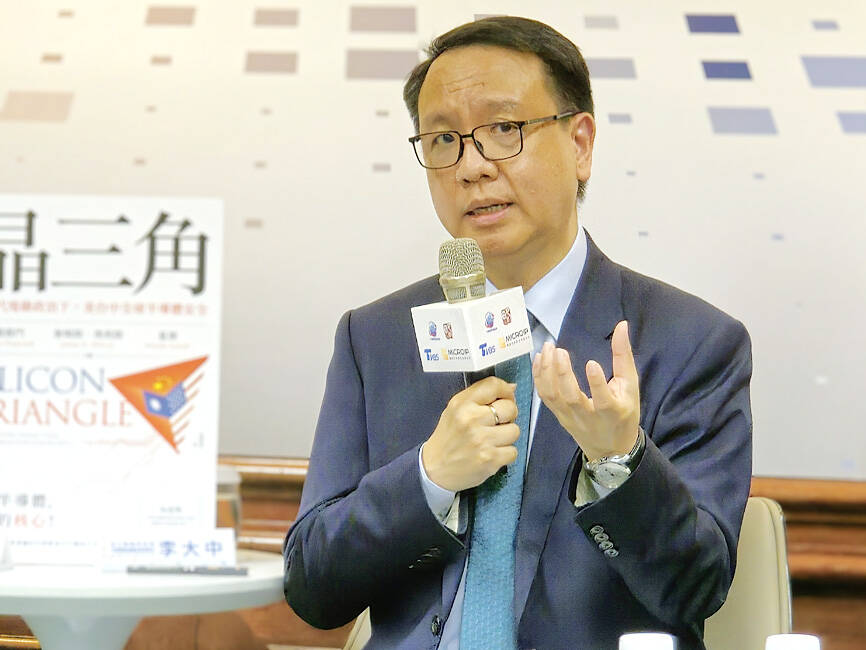In the face of former US president Donald Trump’s re-election, government officials are hopeful that Taiwan-US relations would continue to improve under the new administration, while an expert said that Taiwan should not solely rely on the US.
During his campaign, Trump accused Taiwan of “stealing” the US chip business and repeatedly said he wants to charge the nation a “defense fee.”
Trump clearly feels that Taiwan is not contributing enough and that it should not solely rely on the US, Tamkang University Graduate Institute of International Affairs and Strategic Studies director Li Da-jung (李大中) said yesterday in an interview with NOWnews.

Photo: Fang Wei-li, Taipei Times
Trump’s proposed “defense fee” would hurt major US companies like Apple, Nvidia, Advanced Micro Devices and Intel, as TSMC would pass on the costs to these companies, National Development Council Minister Paul Liu (劉鏡清) said at a meeting of the Legislative Yuan’s Economic Committee.
Trump is unlikely to impose the defense fee, as the resulting price increase could affect public opinion in the US, Liu said.
On the other hand, Trump’s proposal of a 60 percent tariff on Chinese companies and reduction of Chinese imports could benefit Taiwanese businesses by giving them the opportunity to replace Chinese companies, he added.
“Trump’s win would likely benefit Taiwan... Increased US sanctions on China would shield Taiwan from the negative effects of China’s internal economic issues,” he said.
Chinese Nationalist Party (KMT) Chairman Eric Chu (朱立倫) yesterday afternoon congratulated Trump on his victory in a Facebook post, saying that the KMT and the Republican Party have had friendly ties for longer than a century.
Both parties are committed to building an efficient government, competitive economy and stable international order, Chu said.
The KMT looks forward to a more robust Taiwan-US relationship under the “experienced leadership” of Trump and hopes for his continued promotion of peace and stability in the region, Chu said.
KMT Vice Chairman Andrew Hsia (夏立言) and International Affairs Department Director Alexander Huang (黃介正) are to visit Washington tomorrow to meet with US officials and members of key think tanks, he said.
They are to make connections with key players in the new administration and convey that the public majority in Taiwan favors the “status quo,” he added.
In an interview with CNEWS yesterday, Huang said Taiwan should be “extremely vigilant.”
Taiwanese often assume the US would come to Taiwan’s aid in the case of Chinese military action, but both US President Joe Biden and Trump have been hesitant to deploy troops during their terms, he said.
“Taiwan must be cautious during the transition period and establish relationships with incoming team members, especially those that would handle China policy,” he said.
Premier Cho Jung-tai (卓榮泰) addressed Taiwan’s response to potential policy shifts under the Trump administration during a session of the Legislative Yuan yesterday.
“Taiwan has plans in case of any policy changes, and I have confidence in the stability of Taiwan-US relations,” he said.
Although Trump has expressed dissatisfaction with the CHIPS and Science Act, Taiwan has evaluated the potential impacts and prepared countermeasures, reducing the likelihood of significant disruption, Minister of Economic Affairs J.W. Kuo (郭智輝) said.
Additional reporting by Fang Wei-li

The brilliant blue waters, thick foliage and bucolic atmosphere on this seemingly idyllic archipelago deep in the Pacific Ocean belie the key role it now plays in a titanic geopolitical struggle. Palau is again on the front line as China, and the US and its allies prepare their forces in an intensifying contest for control over the Asia-Pacific region. The democratic nation of just 17,000 people hosts US-controlled airstrips and soon-to-be-completed radar installations that the US military describes as “critical” to monitoring vast swathes of water and airspace. It is also a key piece of the second island chain, a string of

A magnitude 5.9 earthquake that struck about 33km off the coast of Hualien City was the "main shock" in a series of quakes in the area, with aftershocks expected over the next three days, the Central Weather Administration (CWA) said yesterday. Prior to the magnitude 5.9 quake shaking most of Taiwan at 6:53pm yesterday, six other earthquakes stronger than a magnitude of 4, starting with a magnitude 5.5 quake at 6:09pm, occurred in the area. CWA Seismological Center Director Wu Chien-fu (吳健富) confirmed that the quakes were all part of the same series and that the magnitude 5.5 temblor was

The Central Weather Administration has issued a heat alert for southeastern Taiwan, warning of temperatures as high as 36°C today, while alerting some coastal areas of strong winds later in the day. Kaohsiung’s Neimen District (內門) and Pingtung County’s Neipu Township (內埔) are under an orange heat alert, which warns of temperatures as high as 36°C for three consecutive days, the CWA said, citing southwest winds. The heat would also extend to Tainan’s Nansi (楠西) and Yujing (玉井) districts, as well as Pingtung’s Gaoshu (高樹), Yanpu (鹽埔) and Majia (瑪家) townships, it said, forecasting highs of up to 36°C in those areas

IN FULL SWING: Recall drives against lawmakers in Hualien, Taoyuan and Hsinchu have reached the second-stage threshold, the campaigners said Campaigners in a recall petition against Chinese Nationalist Party (KMT) Legislator Yen Kuan-heng (顏寬恒) in Taichung yesterday said their signature target is within sight, and that they need a big push to collect about 500 more signatures from locals to reach the second-stage threshold. Recall campaigns against KMT lawmakers Johnny Chiang (江啟臣), Yang Chiung-ying (楊瓊瓔) and Lo Ting-wei (羅廷瑋) are also close to the 10 percent threshold, and campaigners are mounting a final push this week. They need about 800 signatures against Chiang and about 2,000 against Yang. Campaigners seeking to recall Lo said they had reached the threshold figure over the